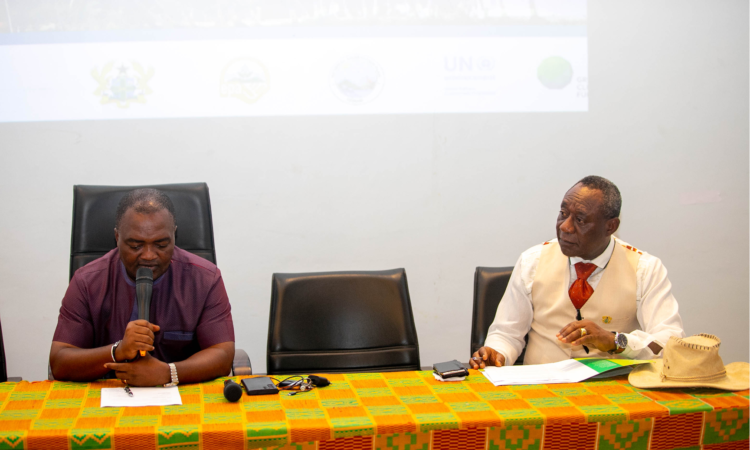
The Executive Director of the Environmental Protection Agency (EPA) Dr. Henry Kwabena Kokofu, has told lawmakers that the National Adaptation Plan (NAP) has come at an opportune time to ensure the country takes steps to address the negative impacts of climate change.
According to him, the framework is of utmost significance and progress has been made from the previous one, as it addresses sustainable development for sound environmental governance by raising awareness and forging collaborations and partnerships with stakeholders.
Addressing members of parliament at the National Adaptation Planning Engagement Session with Parliament in Accra, he “We believe that the results of the projections and the risks assessments have implications on our socio-economic development agenda at different levels. For instance, there could be implications on the legislations, projects, and programmes implementation, research, communication and awareness and even the kind of capacity we develop as a country in this regard.”
The Government of Ghana, operating through the Environmental Protection Agency and under the Ministry of Environment, Science, Technology, and Innovation (MESTI), has been executing the NAP Readiness project since June 2020. This initiative, backed by the Green Climate Fund (GCF), aims to enhance Ghana’s capacity in advancing its National Adaptation Plan (NAP) process.
The United Nations Environment serves as the Delivery Partner, responsible for offering technical support and supervising project implementation. The project facilitates the establishment of systems for exchanging climate risk and vulnerability data and for creating sustainable financing mechanisms to support climate change adaptation efforts in Ghana.

Dr. Antwi Boasiako Amoah, Director, of Climate Vulnerabilities and Adaptation, Environmental Protection Agency further underscored the need for the meeting with the legislature, maintaining that there are different levels of stakeholders in the national development process -with parliament being a key arm of government that is in charge of legislations of this country and they also represent constituencies.
“Whether we like it or not climate change has become topical in today’s socio-economic development and so our engagement today was to point out some of the key risks that climate change is bringing to our socio-economic development and then seek their guidance as to how we address this risk in either in policies, programmes, projects we undertake at various levels”
When we are aware, we act differently, when we are not, we do things differently and so our basic objective is to create awareness medium-long term, because once people are aware it affects policies, technology.”
Further he highlighted that vulnerability to climate change in Ghana is most pronounced for those who rely heavily on natural resources and have limited capacity to cope with these changes, especially those dependent on climate-sensitive livelihoods like agriculture.
“Smallholder farmers, particularly female-headed households, are highly exposed to the impacts of climate change and variability.
Women constitute 52% of the agricultural labour force in Ghana and produce 70% of subsistence crops. They also rely on water and crops for their household responsibilities.” he noted.
The Chairman of the Environment, Science and Technology Committee, Dr. Emmanuel Marfo commended the move and urged members to rally around the plan and ensure that their constituents get to appreciate the negative impacts of climate change.
Mines and Energy Committee chairman, Samuel Atta-Akyea also added that it is not about the multiplicity of laws on climate change but rather enforcement and asked parliament and other stakeholders to ensure that laws regarding the environment and climate are enforced.
The Ranking on Environment, Science and Technology, Ebenezer Okletey Terlabi touched on the fact that issues on climate change are gradually becoming more understandable than before and added that the advent of the new EPA law will resolve challenges of coordination.
Already parliament is considering the Environmental Protection Bill, 2023 which seeks to empower the Environmental Protection Agency to exercise oversight and coordinate all matters relating to the environment and climate change in state agencies.
NAP outlines how the government intends to prepare the country for climate change from health to housing.

As global temperatures continue to rise the risk of extreme events in the country such as high heat, flooding, and storm surge increases, the reason experts are calling for national and local plans to ensure the country can adapt to vulnerabilities.
The NAP process originated from the 16th Conference of the Parties (COP16) to the UNFCCC in 2010, emphasizing the equal importance of adaptation alongside mitigation efforts. The Cancun Adaptation Framework established national adaptation planning processes to identify and address medium- and long-term adaptation needs. Countries worldwide are developing programs to advance their NAP processes, including assessing development needs, climate vulnerabilities, and future scenarios, as well as integrating adaptation into sectoral policies and plans.
This integration is crucial, especially as developing countries have included adaptation objectives in their Nationally Determined Contributions (NDCs) under the Paris Agreement.
By Eugene Davis






